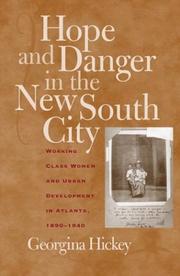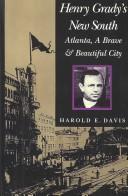| Listing 1 - 10 of 31 | << page >> |
Sort by
|
Book
ISBN: 0822988232 9780822988236 Year: 2021 Publisher: Pittsburgh, Pa.
Abstract | Keywords | Export | Availability | Bookmark
 Loading...
Loading...Choose an application
- Reference Manager
- EndNote
- RefWorks (Direct export to RefWorks)
"Peach State has its origins in Atlanta, Georgia, the author's hometown and an emblematic city of the New South, a name that reflects the American region's invigoration in recent decades by immigration and a spirit of reinvention. Focused mainly on food and cooking, these poems explore the city's transformation from the mid-twentieth century to today, as seen and shaped by Chinese Americans. The poems are set in restaurants, home kitchens, grocery stores, and the houses of friends and neighbors. Often employing forms--sonnet, villanelle, sestina, palindrome, ghazal, rhymed stanzas--they also mirror the constant negotiation with tradition that marks both immigrant and Southern experience"--
American poetry --- 2000-2099 --- Atlanta (Ga.) --- Georgia

ISBN: 1282799886 9786612799884 0820327239 9780820327235 0820323330 9780820323336 0820327727 9780820327723 Year: 2003 Publisher: Athens, Ga. University of Georgia Press
Abstract | Keywords | Export | Availability | Bookmark
 Loading...
Loading...Choose an application
- Reference Manager
- EndNote
- RefWorks (Direct export to RefWorks)
Working class women --- History. --- Atlanta (Ga.)

ISBN: 0807863351 9780807863350 9780807828465 0807828467 0807855170 9780807855171 9798890873408 Year: 2004 Publisher: Chapel Hill : University of North Carolina Press,
Abstract | Keywords | Export | Availability | Bookmark
 Loading...
Loading...Choose an application
- Reference Manager
- EndNote
- RefWorks (Direct export to RefWorks)
Startled by rapid social changes at the turn of the twentieth century, citizens of Atlanta wrestled with fears about the future of race relations, the shape of gender roles, the impact of social class, and the meaning of regional identity in a New South. Gavin James Campbell demonstrates how these anxieties were played out in Atlanta's popular musical entertainment. Examining the period from 1890 to 1925, Campbell focuses on three popular musical institutions: the New York Metropolitan Opera (which visited Atlanta each year), the Colored Music Festival, and the Georgia Old-Time Fiddlers' Conve
Music --- History and criticism. --- Atlanta (Ga.) --- History. --- City of Atlanta (Ga.)
Book
ISBN: 1641137908 9781641137904 9781641137881 1641137886 1641137894 9781641137898 Year: 2019 Publisher: Charlotte, North Carolina : Information Age Publishing, Inc.,
Abstract | Keywords | Export | Availability | Bookmark
 Loading...
Loading...Choose an application
- Reference Manager
- EndNote
- RefWorks (Direct export to RefWorks)
"By relying on the educational models of Wilberforce University and Morehouse College, this study gathered historical artifacts that provide critical responses to the following research questions: What were the similarities and differences between the social, historical, political and cultural forces that led to the founding of the colleges? What were the similar and different motivations and interests of the founding leaders? What were the similar and different effects of these founding leaders on their institutions in their time period? What similar and different supports did these institutions receive from their religious organizations? What can we learn from the impact of these institutions on Black higher education over the last 150 years? The project sets out to answers the aforementioned research questions"--
Payne, Daniel Alexander, --- Wilberforce University --- Morehouse College (Atlanta, Ga.) --- History.
Book
ISBN: 1469635364 1469635372 1469635356 146965475X 9798890848796 9781469635361 9781469635378 9781469635354 Year: 2017 Publisher: Chapel Hill
Abstract | Keywords | Export | Availability | Bookmark
 Loading...
Loading...Choose an application
- Reference Manager
- EndNote
- RefWorks (Direct export to RefWorks)
African Americans --- Economic conditions. --- Social conditions. --- History. --- Atlanta (Ga.) --- History --- Afro-Americans --- Black Americans --- Colored people (United States) --- Negroes --- Africans --- Ethnology --- Blacks --- City of Atlanta (Ga.) --- Black people
Book
ISBN: 0820358126 Year: 2020 Publisher: Athens, Greece : The University of Georgia Press,
Abstract | Keywords | Export | Availability | Bookmark
 Loading...
Loading...Choose an application
- Reference Manager
- EndNote
- RefWorks (Direct export to RefWorks)
"This book examines the ways that Atlantans have remembered the Civil War since 1865. During the Civil War, Atlanta became the second most important city in the Confederacy, after Richmond. Since the end of the war, Atlanta's civic and business leaders promoted its image as a 'Phoenix City' rising from the ashes of General William T. Sherman's wartime destruction. According to this carefully constructed view, Atlanta respects its Confederate past while also moving forward with business growth and 'progress.' Yet in spite of its economic success since 1865, Atlanta is a city where the meaning of the Civil War continues to be debated and contested, where whites and blacks remember the war in different and conflicting ways. Periodically, racial tension has marred the city's reputation and its progressive spirit. Today, Atlanta (and the South) have achieved reconciliation with the North but debate over Civil War memory is ongoing"--
Memorialization --- Collective memory --- Atlanta (Ga.) --- United States --- Race relations. --- History --- Influence. --- History.
Book
ISBN: 9798890856371 146964343X 1469643448 Year: 2018 Publisher: Chapel Hill : Baltimore, Md. : The University of North Carolina Press, Project MUSE,
Abstract | Keywords | Export | Availability | Bookmark
 Loading...
Loading...Choose an application
- Reference Manager
- EndNote
- RefWorks (Direct export to RefWorks)
"As William T. Sherman's Union troops began their campaign for Atlanta in the spring of 1864, they encountered Confederate forces employing field fortifications located to take advantage of rugged terrain. While the Confederates consistently acted on the defensive, digging eighteen lines of earthworks from May to September, the Federals used fieldworks both defensively and offensively. With 160,000 troops engaged on both sides and hundreds of miles of trenches dug, fortifications became a defining factor in the Atlanta campaign battles. These engagements took place on topography ranging from Appalachian foothills to the clay fields of Georgia's Piedmont. Leading military historian Earl J. Hess examines how commanders adapted their operations to the physical environment, how the environment in turn affected their movements, and how Civil War armies altered the terrain through the science of field fortification"--
Fortification --- Atlanta Campaign, 1864. --- United States --- Atlanta (Ga.) --- History --- Campaigns. --- Defenses.
Book
ISBN: 9780820363271 0820363278 Year: 2023 Publisher: Athens : University of Georgia Press,
Abstract | Keywords | Export | Availability | Bookmark
 Loading...
Loading...Choose an application
- Reference Manager
- EndNote
- RefWorks (Direct export to RefWorks)
"Poor Atlanta looks at the poor people's campaigns in Atlanta in the 1960s and 1970s, which operated in relationship to Sunbelt city- building efforts. With these efforts, city leaders aimed to prevent urban violence, staunch disinvestment, check white flight, and amplify Atlanta's importance as a business and transportation hub. As urban leaders promoted Forward Atlanta, a program to, in Mayor Ivan Allen Jr.'s words, "sell the city like a product," poor families insisted that their lives and living conditions, too, should improve. While not always operating within public awareness, antipoverty campaigns among the poor presented a regular and sometimes strident critique of inequality and Atlanta's uneven urban development. With Poor Atlanta, LeeAnn B. Lands demonstrates that, while eclipsed by the Black freedom movement, antipoverty organizing (including direct action campaigns, legal actions, lobbying, and other forms of activism) occurred with regularity from 1964 through 1976. Her analysis is one of the few citywide studies of antipoverty organizing in late twentieth-century America"--
Economic assistance, Domestic --- Poor --- Poverty --- History --- Political activity --- Georgia --- Atlanta (Ga.) --- Social conditions --- Economic conditions

ISBN: 0817382747 9780817382742 0817311874 9780817311872 0817304541 9780817304546 0817304541 9780817311872 9780817304546 Year: 1990 Publisher: Tuscaloosa University of Alabama Press
Abstract | Keywords | Export | Availability | Bookmark
 Loading...
Loading...Choose an application
- Reference Manager
- EndNote
- RefWorks (Direct export to RefWorks)
The popular image of Henry W. Grady is that of a champion of the postbellum South, a region that would forgive the North for defeating it and would mobilize its own many resources for hones business and agricultural competition. Biographies and collections of Grady's essays and speeches that appeared shortly after his death enhanced this image, and for a half-century, Grady was considered the personification of the New South Movement, a movement which promised industrialization for the South, an improved Southern agriculture, and justice and opportunity for black Souther
Agriculture --- Journalists --- Politicians --- Statesmen --- Columnists --- Commentators --- Authors --- Farming --- Husbandry --- Industrial arts --- Life sciences --- Food supply --- Land use, Rural --- History --- Biography. --- Grady, Henry Woodfin, --- Atlanta (Ga.) --- Georgia --- City of Atlanta (Ga.) --- Politics and government. --- Politics and government
Book
ISBN: 0252099842 Year: 2017 Publisher: Urbana, Chicago, Springfield, [Illinois] : University of Illinois Press,
Abstract | Keywords | Export | Availability | Bookmark
 Loading...
Loading...Choose an application
- Reference Manager
- EndNote
- RefWorks (Direct export to RefWorks)
"Secondary level female education played a foundational role in reshaping women's identity in the New South. Sarah H. Case examines the transformative processes involved at two Georgia schools--one in Atlanta for African-American girls and young women, the other in Athens and attended by young white women with elite backgrounds. Focusing on the period between 1880 and 1925, Case's analysis shows how race, gender, sexuality, and region worked within these institutions to shape education. Her comparative approach shines a particular light on how female education embodied the complex ways racial and gender identity functioned at the time. As she shows, the schools cultivated modesty and self-restraint to protect the students. Indeed, concerns about female sexuality and respectability united the schools despite their different student populations. Case also follows the lives of the women as adult teachers, alumnae, and activists who drew on their education to negotiate the New South's economic and social upheavals"--
Women --- African American women --- Women, White --- Education --- History. --- Social conditions. --- Lucy Cobb Institute (Athens, Ga.) --- Spelman Seminary (Atlanta, Ga.)
| Listing 1 - 10 of 31 | << page >> |
Sort by
|

 Search
Search Feedback
Feedback About UniCat
About UniCat  Help
Help News
News